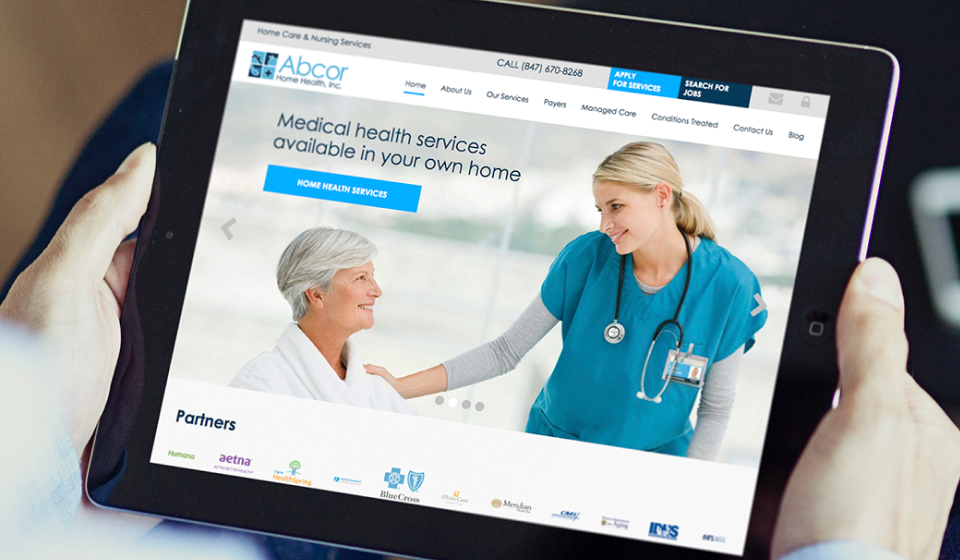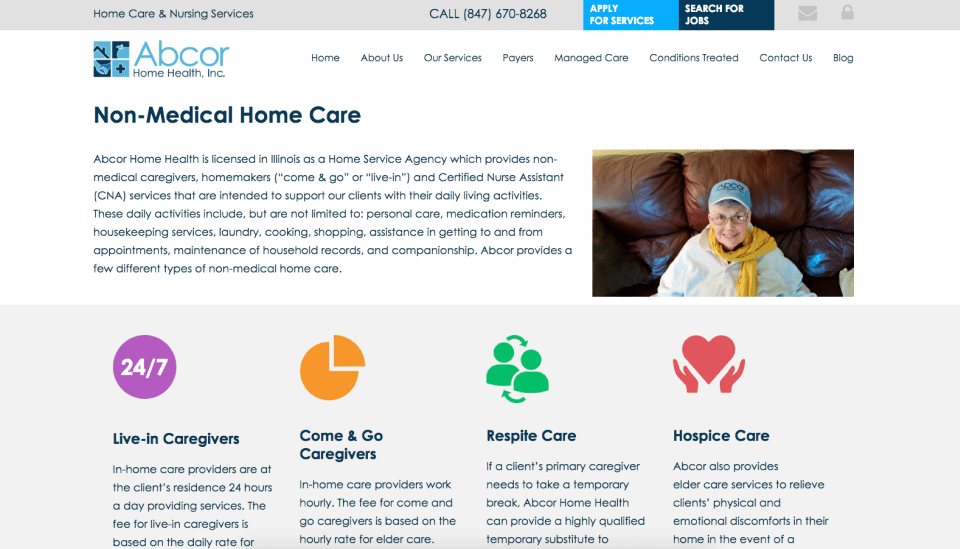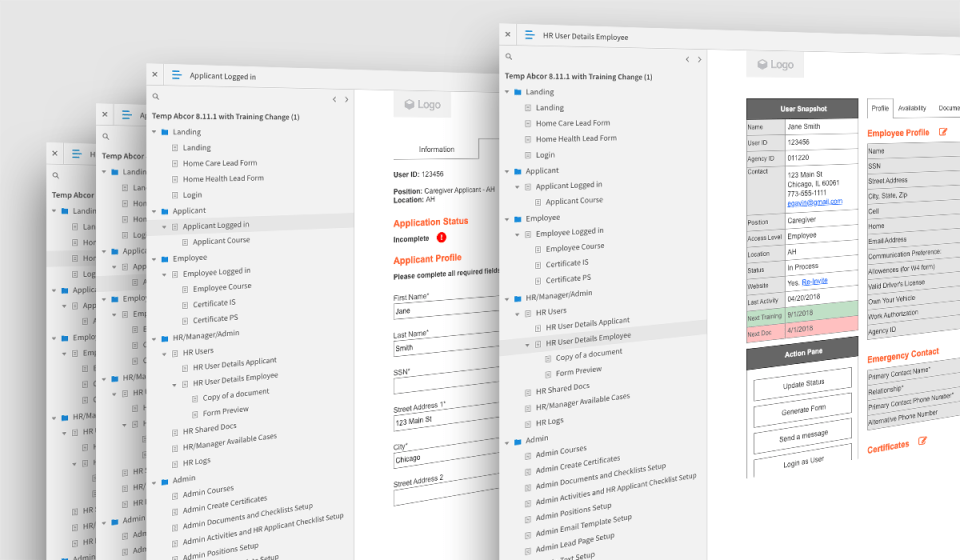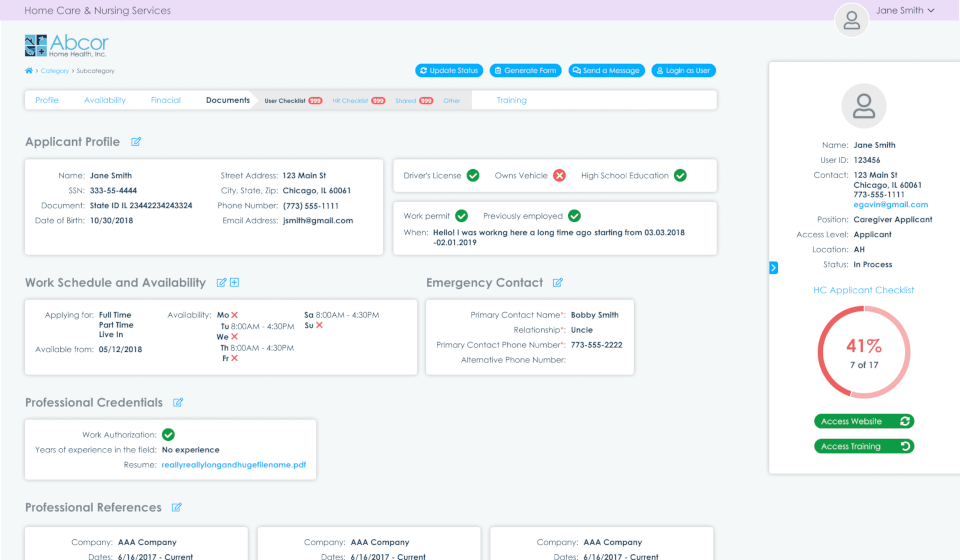Each of our clients is a story of an individual approach and a rapid digital transformation of business processes. However, one of the significant and long-term projects is associated with a company whose activities are not limited to the term "business."
Abcor is more than just a business. The company provides quality Home & Health care due to professional recruitment and selects the most appropriate staff by many parameters. Each of them is regulated by local and federal laws - from licenses and certifications to mandatory staff training. The company's activities are based on strict government regulatory reporting and ongoing audits.

Home Care and Home Health companies are traditionally founded by a limited group of people. At this stage, the number of tasks, documents, required notifications, and business process standards can be stored in a reasonably small folder. However, the specifics of such business growth are a constant increase in the number of clients and employees. When such a company exceeds the first hundred employees, there appear apparent problems due to the activity that is covered by state licensing. Every employee must keep an updated driving license, take mandatory in-service training, and sign necessary disclosures. Simultaneously, when hiring a staff member, it is imperative to prepare, sign, and store a vast scope of documents. It is unlikely that one HR specialist will be enough to solve such issues. When the state audit comes up, the company must provide all the necessary information about the employees within a few days.
Has Abcor become an exception? Not. When the business grew to 1200-1500 employees annually, Abcor had to hire an HR compliance manager in each of its four offices to fulfill the critical need for a massive amount of paperwork. Simultaneously, the new standards became almost impossible to implement, and centralized control of mandatory training of Abcor employees was not at all feasible.
The management of the company recognized each of these issues. There was no question of the need for digital transformation; it was important how fast it would happen. To solve such a task in a short time is one of the Fix ideas for many companies. Surprisingly, many Home Care & Home Health companies in the states still manage their HR tasks "manually."
In such situations, it is essential to have a fundamental vision for the smooth and rapid transformation of a vast bureaucratic system into the digital world. For this purpose, we have developed our specific approach to the implementation of complex projects. Step by step, we have moved towards what Abcor has today.
1. Business Intelligence & Scope Assessment

Neologic became part of the company's business processes. Surely you might have seen similar use cases, but hardly anyone has explained how and why to integrate into a client's internal operations. We will dwell on this.
We analyzed data, assessed business growth dynamics, and compliance with the requirements of government regulators. The Neologic product manager was assigned to the company and described a clear user flow for each client, each caregiver, and each office employee.
So, "being a user," we realized what challenges the upcoming caregivers would face. The recruitment process in such organizations is a too time-consuming procedure, requiring a significant amount of documents. Simultaneously, while for home care positions, the requirements are limited to the current license and primary education, for home health positions, additional documents confirming the current qualification are required. Drafting, verification, and other mandatory company documents are the processes that distract the potential employee from a socially valuable job. But even after receiving the cherished offer, caregivers face the need not only to pass but also to confirm the completion of mandatory annual 12-hour training courses. Such training determines the prospective behavior of employees. Every Abcor specialist should know how to contact emergency services, what to do in situations related to the client's health, and avoid under any circumstances. However, not everyone is ready to switch on their laptop, " battle against" the outdated training system, and spend half a day on it, especially if the company has no control over the process and outcome of training.
"As a client," we have tried various situations that can affect the company's quality of services. Based on the company's data, we have identified several processes to automate to improve service quality. Thus, for many clients, not only the details related to the direct influence of care giver's preferences on the client's health (for example, pets' presence, which can cause allergic reactions) and free communication in a client’s language are essential. Connecting such demands with suitable employees is a task for which we subsequently proposed a customized solution.
When we interviewed an HR manager, we faced an uncontrolled paper flow of all documents. There was a large file cabinet in each of the four Abcor offices. HR specialists also faced the daily need to notify employees about permits' extension and internal amendments. Moreover, the supervision of working hours spent by the employee at the client also became a problem. Controlling and verifying compliance with mandatory training for HR managers was also a pain in the neck, as well as interaction with other offices. HR specialists also faced the need to conduct numerous document review and interviewing activities for candidates for positions with low qualifications.
The company's management needed to receive relevant activity reports to make decisions that would accelerate its growth and support compliance. Controlling the growing office workforce and ensuring staff and clients' growth required the automation of existing processes.
2. Methodology Selection
Establishing even the most precise business requirements does not mean that developers will build the system you need. A team of software engineers needs to provide a complete solution. Otherwise, the bulk of software companies would choose Agile as a project methodology. For Abcor, such a way looked the most impractical. The project would have dragged on or overdrawn the budget.
If business requirements are evident and particular solutions are essential for the development team, the Predictive approach is more relevant. This methodology was appropriate for a specific case and applicable for virtually any large-scale software project. Despite a reasonably long-term build-up of precise requirements, the predictive approach allows us to meet the budget and implement the project on time.
3. Prototyping. FSD

To establish precise requirements for the predictive approach development process and visualize the upcoming system for company management, we use a unique tool - functional prototyping. It is a visualized analog of the Functional Specification Document (FSD).
With the help of prototyping, we were able to show the process of using the system to Abcor management within a few hours, saving time on a thorough study of PRD (project requirements document) and holding numerous meetings to approve the amendments. The company's management figured out how business solutions work by personally trying on each role in the system and made some small changes in the prototypes. Prototype modifications, typically, don't take more than a few hours for the product manager, but changes in the development process can take days of work of the whole team. It shows the importance of the manager's role, who has integrated into the company's business processes.
Abcor prototypes and requirements were built within 2 months - a period that does not look small at first sight. However, the visualization of the FSD without programming has reduced the more cost-intensive development process. Moreover, at this stage, there is an essential process for competitive analysis of such systems. Thus, the largest competitor of Abcor in the region has implemented only a part of the functions we have put in the upcoming system. Even today, they don't have any semblance of HR work automation and staff training.
Only after Abcor approved prototypes, the development team receives a detailed specification from our manager. Due to this combination, the system's complete logic is built up, and the upcoming development is brought to a systematic process.
Abcor received a detailed specification for the developers, and a fully working prototype with thoughtful logic and user flows. Neologic took even the slightest details of the process of selection, hiring, onboarding, training into consideration. Prototypes allowed us to preview and make system adjustments painlessly in terms of time and financial costs.
4. Project Requirements. PRD
Based on the upcoming system's data and user flows analysis, and prototypes, we have formed detailed requirements for Abcor. We systematized the requirements and proposed concrete solutions, showing them in the Project Requirements Document (PRD).
For potential employees, we proposed an internal HR portal project. Depending on qualifications, each candidate could apply for a position within a few minutes, uploading all the necessary documents to their profile. For current Abcor employees, such a portal would be a universal tool for obtaining and verifying mandatory pre-service (24 hours) and annual (12 hours) training courses. Moreover, it would no longer be possible to forget about expired driving licenses. Furthermore, all the portal features became available on mobile devices.
For the clients, it was vital to design an automated tool that would generate a list of caregivers that best match the client based on a variety of custom factors. We paid particular attention to scheduling and billing processes, allowing clients to connect them with caregivers and get the necessary assistance just in time.
HR managers required a complete caregiver profile with check-lists to validate the tests and the time spent on training. HR also needed to customize the user registration process and add fields and documents that are currently required. Setting up automatic customizable reminders for each caregiver's records is also a task that should be automated to increase the HR department's efficiency. Customized scripts for phone interviews would improve the company's quality of services by hiring more qualified personnel. Each of the actions, each of the documents should be digitized and stored in the system. The ultimate goal is to completely eliminate paperwork.
HR portal for management is an opportunity to optimize work and customize processes and store and manage data for the company's development. Automatic reports on each employee and operation is an opportunity for managers to track the problem and correct faults. We found a great benefit for the management in creating active check-lists for HR specialists, where the manager can mark all the main stages of hiring a new employee. The system should not allow an HR specialist to hire an employee without meeting all requirements.
It is possible to establish project requirements without being involved in the company's processes, but it is impossible to develop an efficient product. Clear-cut requirements based on real business needs are the key to the success of the any digital product.
5. Implementation

Using the predictive approach, visualized prototypes, and precise specification, our development team conducted the development process smoothly, without unforeseen incidents, and provided a fully working, tested system on time. We spent nine months on the development of the system, steadily implementing all the functionality it provides. The dev team transferred almost all the solutions shown in the prototypes to the working system without any changes.
However, the main thing we have gained is a business problem solution. Abcor business processes are simpler, faster, and more efficient now. At the same time, automation has not brought negative consequences in the sense of firing. Employees responsible for paperwork in 4 offices of the company have migrated to other positions within the company, increasing their productivity.
6. Maintenance & Support
The systems requiring constant technical and consulting support are inadequate. Typically, they have no business value and divert resources to solving problems that the company did not have before. Digital transformation means solving challenges, not adding new ones. That's why we build systems where every user, due to custom solutions, can set up the proper workspace within the company's standards and fix all the shortcomings on their own or with a supervisor's help. We intervene on an emergency basis only in unique cases to resolve any issues that may arise. At the same time, we are available 24/7 for each of our clients.
Today, the Abcor HR portal has become a unique software solution for optimizing and automating HR processes in HealthCare. Although the system was designed specifically for a particular company's business requirements, it can easily be transformed to meet similar companies' custom demands.
The question is: are you ready to take the first step towards digital transformation?
To discuss the ultimate solution for your company
book a convenient time to call or make an appointment